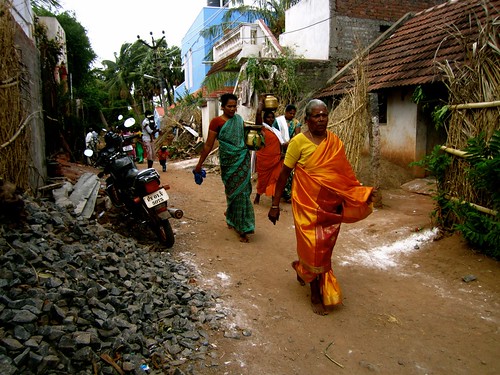India: Absolute Relatives
After living in India for the past month and a half and Indonesia earlier, we’d gotten pretty much used to power cuts. But not like this one.
If it was any other day, the electricity would cut off every now and then, a few hours here, a few there. For that time, all you can do when the fan stops spinning is close your eyes and keep saying to yourself, “This is not hell. This is just a sauna.” Today wasn’t like those other days. Today was a scheduled all-day blackout, where there’s absolutely no power from about 9 a.m. to 6 p.m. or later. This is normal, our hosts explain. Happens at least once a month. Just another day in the village.
Since mid-June, Asia and I have been living the village life. Staying with a family near Pondicherry in South India, on the outskirts of a town called Auroville. We came down this way only planning to stay a month. But we met a young woman in an internet cafe who told us her family had a room available that they rent out. The deal was way too good to pass up. Especially since we’d get that authentic experience of living with a local family, including homemade meals and squat toilets. We knew off the bat it’d be nothing like living in a hostel or guesthouse, so goodbye A/C, goodbye bed, goodbye Wifi. And that was all good because who really needs those luxuries anyway? I mean, what’s the difference between a bed and the floor other than height? And a squat toilet’s nothing but a crappy carnival game, if you think about it.
But that power. Crazy how that was the biggest adjustment. Not like we have any electronics other than our laptops and a phone. But the cuts happen without warning. Even if you try to expect them when you least expect them, you’ll still be surprised. And surprised we are today, sitting here with the daughter in the middle of a scorching afternoon. No matter what I tell myself, I know this is no sauna.
But it got me thinking about power. And how the same word we use for electricity and energy also stands for dominance and control. This thirst for power goes back to the beginning of time, far as I know. It seems to be hardwired into our DNA. That being said, does our humanity become our own excuse? Or are we expected, in an ideal world, to surrender that hunger for power because we’re conscious of it? On this one episode of RadioLab, I remember hearing that back in the ‘60s, one in three people thought humanity would eventually get to a point where there’s no more wars. Nowadays, only one in 10 people feel that way. Most feel like we’ll never evolve beyond our compulsion for power and greed and so forth.
Hard to see it any other way when you read about a girl named Heaven who was killed by a stray bullet in a Chicago candy store. Or when, even here in Auroville — a town built on principles of seeking divinity and attaining higher consciousness — a French girl riding her bicycle can be attacked, raped and burned alive, which is what happened a few weeks ago. That power. At the root of all the world’s ills, this is what we find. Except this is a perverted sense of power that creates darkness, not light. Will we ever evolve?
It’s going on 7 p.m. now. The power’s still not on. We’re sitting in the main room with the family, drinking Chai tea. The father’s sitting alone out on the porch. We found out that last year, the family had a big fight. From what we were told, the father got drunk one night and was going back and forth with his son when things turned violent. He took a torch, burned his son’s arm. The son swung a stick across his father’s face, knocking out several teeth. They still live under one roof, but they don’t speak to each other.
The son told us his side, but I’m sure there’s more to the story. The father doesn’t speak English so we can’t really talk to him. More often than not, he’s there, but not really there. It’s close to eight when the sun disappears. The village gets swallowed by shadows. In the home, the daughter lights candles so we can see.
I go out to the porch to sit with the father. We’re sitting here now in silence, watching chickens mill about in the dirt. We don’t speak the same language, but I recognize the pain in his eyes. Something in him that maybe wants things to be different. Maybe he refuses to swallow his pride. Or maybe prior attempts to reconcile failed. I don’t know. I can’t ask. But this is the same expression I’ve seen on the faces of many men, and in my own reflection, this need to feel in control. This internal power struggle that manifests in the world around us and hurts those closest to us.
Will we ever evolve? Hard to see from where I’m sitting.

